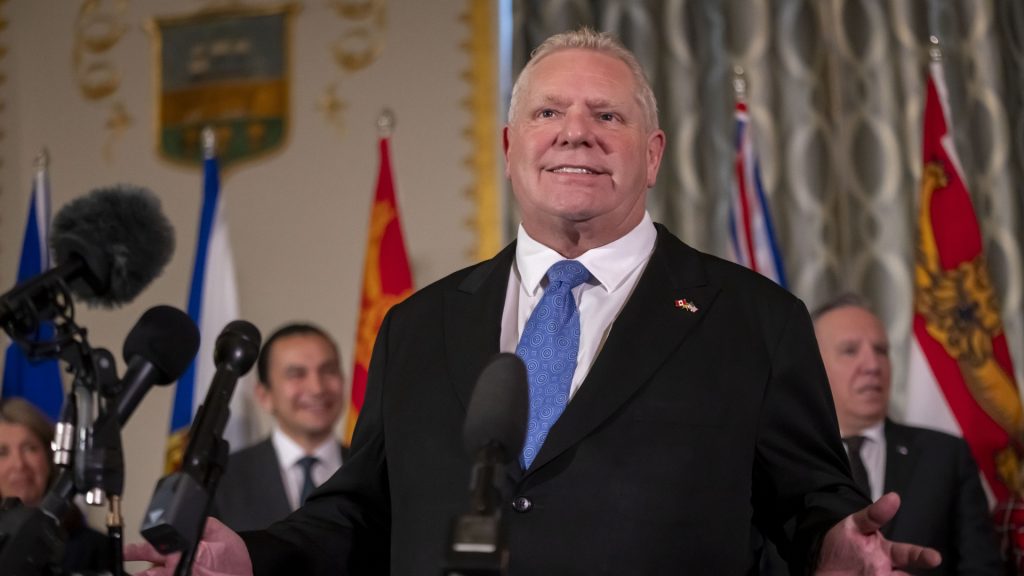Trump cancels trade talks with Canada over anti-tariff Reagan ad

President Donald Trump said he’s pulled the U.S. out of trade talks with Canada following an anti-tariffs ad put together by Ontario’s provincial government. That ad uses quotes from a speech given by former President Ronald Reagan 38 years ago.
What’s in the ad?
The ad uses excerpts from a Reagan speech on April 25, 1987, that aired over the radio.
“Over the long run, such trade barriers hurt every American worker and consumer,” Reagan said in part of that address used in the ad.
The ad pulls quotes like that from the full speech to criticize Trump’s ongoing tariffs on Canada.
Trump responded on social media.
“They fraudulently took a big buy ad saying that Ronald Reagan did not like Tariffs, when actually he LOVED TARIFFS FOR OUR COUNTRY, AND ITS NATIONAL SECURITY,” Trump wrote on Truth Social.
None of the words of Reagan’s speech have been altered; rather, they have been taken in clips.
“That’s pretty much every attack ad that you’ve ever heard of,” Rebecca Tushnet, law professor at Harvard University, told Straight Arrow News. “So no, there’s no requirement to be fair. Even if you think they were being unfair, there’s no requirement to be fair in political discourse.”
Ontario now plans to pull that ad on Monday following Trump’s ending of trade talks and a conversation with Canadian Prime Minister Mark Carney, Ontario Premier Doug Ford said. However, it will still be seen by millions watching the World Series this weekend.
In a statement on X, Ford said the intention with the ad was to “initiate a conversation about the kind of economy that Americans want to build and the impact of tariffs on workers and businesses.”
“Canada and the U.S. are neighbours, friends and allies,” Ford said. “We’re so much stronger when we work together. Let’s work together to build Fortress Am-Can and make our two countries stronger, more prosperous and more secure.”
Reagan and tariffs
Despite Trump’s assertions, Reagan was not a fan of tariffs and often criticized government policies on them.
That speech used in the ad came after Reagan imposed tariffs on Japanese semiconductors. He used it to explain why he did that, even though it went against his reputation as a president for free trade.
“High tariffs inevitably lead to retaliation by foreign countries and the triggering of fierce trade wars,” Reagan said in that address. “The result is more and more tariffs, higher and higher trade barriers and less and less competition.”
Reagan again addressed his views on trade eight months later in the 1988 State of the Union address.
“A creative, competitive America is the answer to a changing world,” Reagan said. “Not trade wars that would close doors, create greater barriers and destroy millions of jobs. We should always remember protectionism is destructionism. America’s jobs, America’s growth, America’s future depend on trade. Trade that is free, open and fair.”
Despite many statements like that over his two terms, Reagan’s policies could sometimes tell a bit of a different story.
Along with the semiconductor tariffs on Japan, Reagan imposed a 100% tariff on Japanese electronics in 1987 and levied tariffs on the European Economic Community on pasta and other food products.
Legal backlash
The Ronald Reagan Presidential Foundation and Institute responded to the ad with a statement saying they plan to review their legal options on the matter.
“The ad misrepresents the Presidential Radio address, and the Government of Ontario did not seek nor receive permission to use and edit the remarks,” the statement reads in part.
But did they need permission?
“Intuitively, this seems to go more into the copyright realm, which immediately runs into a problem, which is that under U.S. copyright law, you cannot have a copyright for government work,” Michael Goodyear, associate professor at New York Law School, told SAN. “So, any government works do not get copyright. It’s right there in Section 105 of the Copyright Act.”
Because Reagan gave this speech in his official capacity as a government employee, it will be hard to make a copyright argument.
“The speech itself is not copyrightable, because it was created by Reagan performing his official duties while President of the United States,” Clay Calvert, non-resident senior fellow at the American Enterprise Institute, said to SAN.
Calvert said one area where legal pushback could work is the question of who owns the original recording of that speech.
“Who actually owns the videotape of it? Which is a different issue from the text of the speech itself,” Calvert said.
The experts SAN spoke with said the odds of that working as a legal argument are also a bit of a long shot because whoever recorded it was likely also a government official.
There’s the written speech, the audio recording of the speech and the video recording of the speech.
“Likely all three would fall into that government work exception,” Goodyear said.
Tushnet called any potential lawsuit “deeply silly.”
“He was a political figure,” Tushnet said. “It’s a political ad. There is not a right by a deceased politician to control the uses of that politician’s image in political discourse.”
That brings up another point often associated with copyright cases: the need to show some kind of harm, whether monetary, reputational, etc.
“In this case, who is harmed?” Calvert said. “Reagan’s been dead for years, and how is his estate at all harmed by any editing of the videotape?”
Goodyear did point out that there might be one case that could be made, namely the right of publicity. That grants individuals control over the commercial use of their identity.
There is no federal version of that, but some states have that policy. That includes California, where Reagan would likely be governed, since it’s where he lived and died.
But even for that case to be made, it’s an uphill battle.
“To make an implicit claim, you have to show an injury,” Goodyear said. “And it’s unclear what the injury to Reagan is. Certainly, there’s not a kind of a monetary aspect here that would come into play, but also, these are the words that Reagan said.”
The Reagan Foundation has previously sued over alleged trademark violations involving Trump-Reagan merchandise. That suit ended with a permanent injunction in favor of the foundation.
But this time around, it seems like a tougher sell.
“It would be actively astonishing to see a successful challenge to use of a politician in political advertising,” Tushnet said.
The post Trump cancels trade talks with Canada over anti-tariff Reagan ad appeared first on Straight Arrow News.





